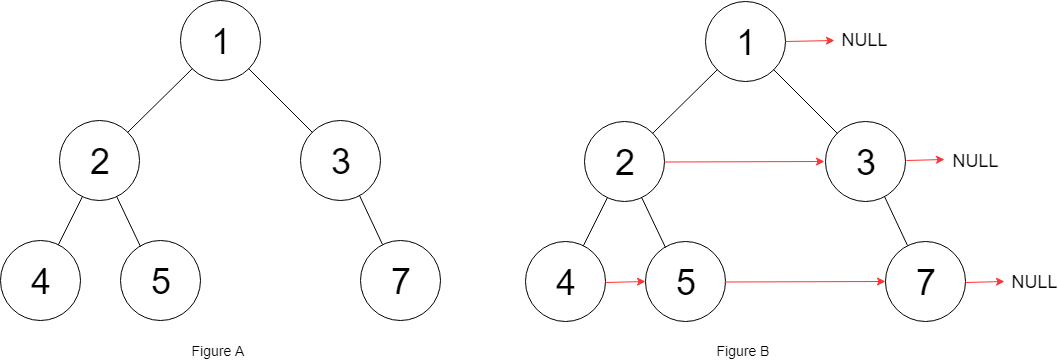难度:中等
https://leetcode-cn.com/problems/populating-next-right-pointers-in-each-node-ii/
给定一个二叉树
struct Node {
int val;
Node *left;
Node *right;
Node *next;
}
填充它的每个 next 指针,让这个指针指向其下一个右侧节点。如果找不到下一个右侧节
点,则将 next 指针设置为 NULL。
初始状态下,所有 next 指针都被设置为 NULL。
进阶:
- 你只能使用常量级额外空间。
- 使用递归解题也符合要求,本题中递归程序占用的栈空间不算做额外的空间复杂度。
输入:root = [1,2,3,4,5,null,7]
输出:[1,#,2,3,#,4,5,7,#]
解释:给定二叉树如图 A 所示,你的函数应该填充它的每个 next 指针,以指向其下一个右侧节点,如图 B 所示。序列化输出按层序遍历顺序(由 next 指针连接),'#' 表示每层的末尾。
/**
* 层级遍历
* @desc 时间复杂度 O(N) 空间复杂度 O(N)
* @param root
*/
export function connect(root: Node | null): Node | null {
if (root === null) return null;
const queue: Node[] = [root];
while (queue.length) {
const len = queue.length;
let last: Node | null = null;
for (let i = 0; i < len; i++) {
const node = queue.pop()!;
if (node.left) queue.unshift(node.left);
if (node.right) queue.unshift(node.right);
if (last) last.next = node;
last = node;
}
}
return root;
}/**
* 使用已建立的 next 指针
* @desc 时间复杂度 O(N) 空间复杂度 O(1)
* @param root
*/
export function connect2(root: Node | null): Node | null {
if (root === null) return null;
let start: Node | null = root;
let last: Node | null;
let nextStart: Node | null;
while (start) {
last = null;
nextStart = null;
for (let p: Node | null = start; p !== null; p = p.next) {
p.left && handle(p.left);
p.right && handle(p.right);
start = nextStart;
}
}
return root;
function handle(p: Node) {
if (last) last.next = p;
if (nextStart === null) nextStart = p;
last = p;
}
}